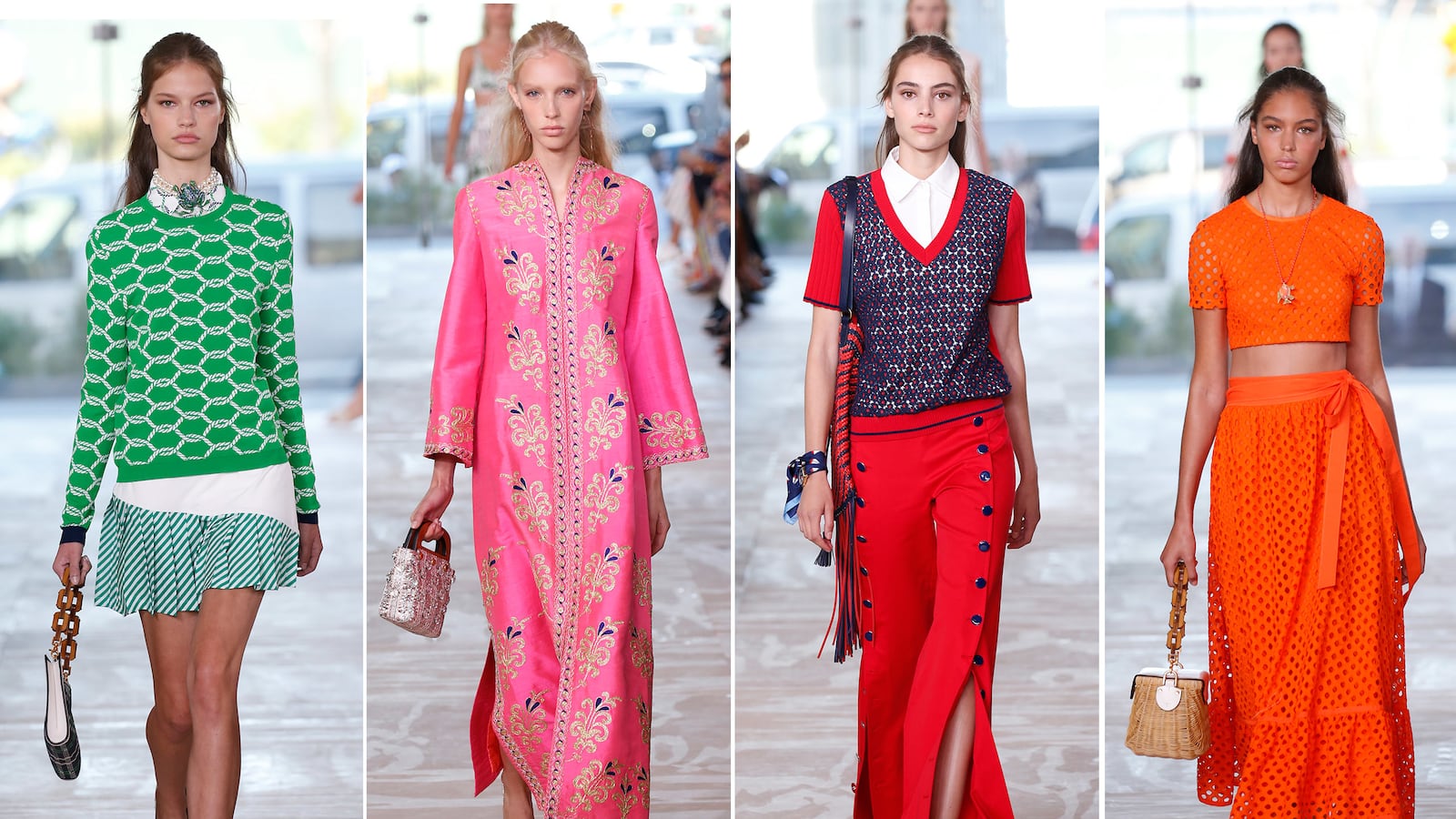Tory Burch by Lizzie Crocker
Having long staged her early morning fashion shows in the sun-soaked gallery of Lincoln Center’s Alice Tully Hall, Tory Burch managed to find the same airy vibe in a downtown venue this year: the Whitney Museum.
Burch has a pleasant, gentle way of waking up the fashion crowd with her reliably sunny collections. This season’s offerings were as quintessentially Tory as they come, imbued with preppy nostalgia that harkened back to her early, brand-establishing staples.
The show opened with a pink and green cardigan (doesn’t get more old-school preppy than that) and the Bee Gees crooning about going home to Massachusetts, of course.
Models wore updated versions of the WASP-y classics you’d find in your Yankee grandmother’s closet: smoking jackets in tweed or navy blue with white piping, crisp white eyelet tops, nautical sweaters (one in Kelly green with a rope-braid print and one in navy with “Ahoy” emblazoned all over), double stranded pearl necklaces with frog brooches, and a fuchsia kaftan with gold embroidery.
Nantucket reds and whale prints are synonymous with staid New Englanders who would sooner die than leave their preppy enclaves.
Burch may have referenced their style this season (and in countless other collections since launching her brand 16 years ago), but she isn’t one of them. The Tory girl is preppy, for sure, but not in an obnoxious way. She’s too laid back and modern, and is seduced by all things bohemian.
So while the designer’s spring collection paid homage to East Coast “hostess chic” and “cool prep,” it was also an ode to the more “free-spirited beach towns” of the West Coast—reflected in beaded prairie skirts, orange prairie dresses in floral and paisley prints, lace-up suede shorts and a multicolored crochet skirt.
Burch summed it up as “quintessential American style.” It didn’t compete with some of the groundbreaking collections we’ve seen this week, but that’s not what Burch was going for anyway.
The clothes were still inspiring and immensely wearable, a collection that, Burch said, was “relaxed and effortless”—not necessarily the reality of going home for most of us, but certainly what it looks like through the lens of nostalgia.
Sally LaPointe by Jay Michaelson
There’s always something reassuring about minimalism. Accentuating a single gesture, perhaps in repetition, gives space for the image, sound, or movement to unfold—even to breathe. Especially in light of some of the more endurance-oriented antics of this year’s Fashion Week, Sally LaPointe’s show at a warehouse-like Chelsea gallery, featuring a modernist/minimalist set, drone-like music, and LaPointe’s accessible, gestural collection felt mercifully clear in comparison.
For Spring, LaPointe’s familiar fur-trimmed sleeves have given way to fringes—on chests, on arms, on midriffs, on legs—that felt like riffs on LaPointe’s style, extension without repetition. Notably, these were among the first looks she showed, as the ambient drones gave way to electronica, as if to check them off the list.
What followed were a series of diaphanous, summery dresses in white and peach; a handful of black-and-silver riffs on punk, military, and athletic looks (epaulets, rips, spangles); and a series of sleeveless outfits with leather corsets that wouldn’t be out of place on Folsom Street in San Francisco.
LaPointe’s notes tell us that the collection is about “the strength in the vulnerability that comes with a broken heart.”
Yet like the iconic photo of Johnny Cash giving a photographer the finger—which LaPointe featured in the program – the emphasis is on the resilience, not the heartbreak. (One T-shirt/leather pants combo reproduced the “Cash” logo from the American Recordings series—in light of the more gestural nature of the other pieces, this one’s literalism felt out of place.)
The strong lines, solid colors, bustiers, corsets and so on all seemed to say “this is not a woman you want to mess with.” Even in peach.
Dennis Basso by Tim Teeman
Wow, Dennis Basso knows how to present a NYFW show: his spring/summer presentation featured 61 dresses. These swirled past in sumptuous and bead-encrusted floaty materials, many overlain with fur, or possessed fur as an unapologetic mainstay.

Basso sounds a riot. In one past interview, he explained he had entered the fur business, “because I loved the fact that something could cost thousands and thousands and thousands and thousands of dollars!”
In the same interview Basso said his firm never uses endangered animals, and that the animals used in the making of his clothes were humanely treated.
The range of styles in this collection was dizzying enough—seguing from a camel suede cocktail dress to a hand-beaded blush lace T-shirt dress to a Russian lynx and pleated clay chiffon jacket with pleated chiffon dress. A white sable and chiffon jacket came with a white chiffon dress.
The Basso wearer needs to be sure about wearing fur (for those with long memories of blood being thrown by demonstrators it seems so odd that fur is now so acceptable). She also needs to be fine with not wearing a bra if she follows the lead of Basso’s models.
Some blouses were see-through, some dresses barely kept chests in. But, even when it came to these daring pieces, the design itself did not feel smutty.
The women looking blissful at the passing parade from the front row—all smartly dressed and while aged, mysteriously unlined too—did not seem phased by the relentless luxe. One woman even had a male friend carry her little dog around before it was safely returned to mama for the start of the show.
If fur dramatically anchored and offset some pieces, others used exquisite embroidery, lace and floral designs, and beading, to give them their notes of distinction. While there were shorter dresses, Basso’s guiding philosophy seems to be: the longer the better. The beautiful column dresses in gold, silver, in cascading chiffon or shimmering lamé, were made for red carpets: they even looked like statuesque awards themselves.
The more ethereal creations in tulle, chiffon and charmeuse were for lost, romantic nights at the opera, but Basso is a realist-romantic, combining a tulle gown with a clay suede cape.
Last and best of all, was the 61-year-old Basso himself. After the models had completed their final parade, we saw an ebullient designer not content with just bowing meekly and scurrying backstage, but instead Basso himself walked the huge U-shaped runway, soaking up the praise and applause.
The exuberant spirit of the clothes, you realized, was very much the spirit of the man. In the same interview quoted above, Basso was asked to identify his favorite coat. “It’s called SOLD!” he replied.
Jil Sander ‘Navy’ by Tim Teeman
Thank you, Jil Sander Navy. Thank you for showing your New York Fashion Week spring/summer collection in an airy loft in West Chelsea for people to drop into during the day. That way, you—and by ‘you’ we mean the 'Navy' design team—banished the madness of Fashion Week, which, now nearly a week in, has left many weary.

“It’s just so nice to have some peace,” one person said as they surveyed the room.
Attendees had the heady freedom of no crowds or crush, just a large room with mannequins grouped on some pedestals. A handsome waiter bought drinks of choice.
A PR did not scowl, or chide, or block, but rather happily answered questions and warmly welcomed every new arrival, with a cheery “Welcome to French aristocracy,” which apparently was the collection’s chief inspiration—as well, as some notes revealed, “the emotional aspects of femininity, sensuality, and fluidity.”
If, by invoking French aristos, you were imagining powdered wigs, groaning busts, and lividly-colored pantaloons, you were to be disappointed. The collection had a simple, no airs-grace to it, which may mean the French aristocracy are roughing it these days, or have fallen out of love with bon-bons and in love with ‘ath-leisure.’
The invocation of aristocracy, however, referred to “the usage of form, proportion, length, and volume.”
The Jil Sander ‘Navy’ customer you could imagine to be graceful, perhaps in a wide band of fashion-enjoying-but-not-enslaved middle age.
High-waisted dresses came simply sculpted in whites and browns, or strapless with scallop-shaped neck; cable knits were skinny and sensible, and stylish jackets could double for morning run or school run; one was dramatically belted at the waist and paired with flared shorts.
Black, navy, mint, olive, pink were the colors of choice for short jackets, A-line skirts, and short culottes, with the occasional white trouser suit and black sleeveless dress for when only dress-up will do. Striped and sleeved exercise jerseys were paired with skirts, while a dash of hippy chic was added with a two-tone green and pink patterned smock dress.
It was only after being there a few minutes that I realized a little group of us were peering down more than we were looking up, and that was because of the shoes, which were flats or heels and decorated in pretty stripes of green and orange, paired with black and white dots, and then sometimes with a multicolored matrix on their reverse.
I’m not sure what Marie Antoinette would have made of the beguiling simplicity on display, but ‘Jil Sander Navy’ would have made the most ardent anti-monarchist fall in love with the French aristocracy—and, after this peaceful interlude, back in love with the furies of Fashion Week.







